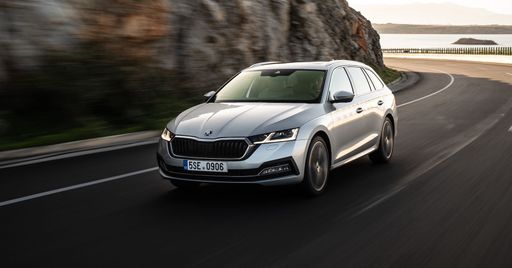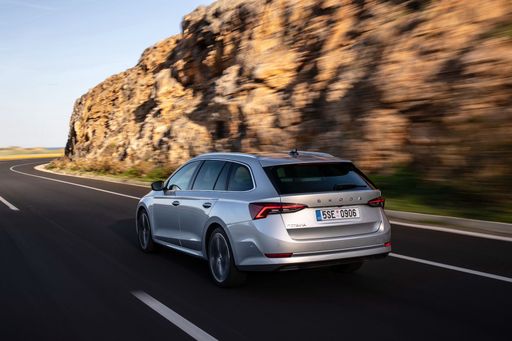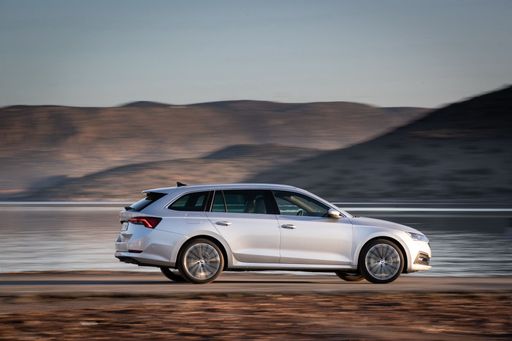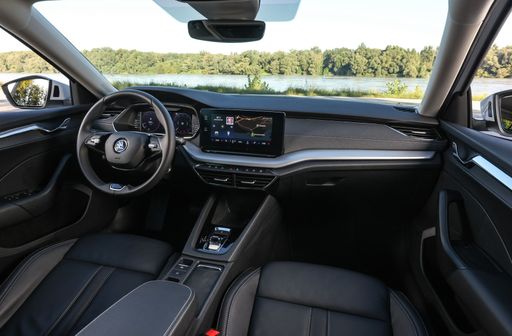Skoda Octavia Combi VS Toyota Prius
Skoda Octavia Combi
The Skoda Octavia Wagon impresses with its spacious interior, offering ample room for both passengers and luggage. It maintains a sleek and modern design, making it a stylish choice for families and professionals alike. The vehicle boasts an efficient engine range, providing a smooth and responsive driving experience.
detailsToyota Prius
The Toyota Prius stands as a pioneer in the realm of hybrid vehicles, offering an eco-friendly driving alternative with its innovative technology. Its aerodynamic design and comfortable interior make it a practical choice for those looking to reduce their carbon footprint without sacrificing style. Additionally, the Prius boasts a reputation for reliability and efficiency, contributing to its lasting popularity among environmentally conscious drivers.
details @ skoda-media.de
@ skoda-media.de
 @ skoda-media.de
@ skoda-media.de
 @ skoda-media.de
@ skoda-media.de
 @ skoda-media.de
@ skoda-media.de
 @ Toyota
@ Toyota
 @ Toyota
@ Toyota
 @ Toyota
@ Toyota
 @ Toyota
@ Toyota

|

|
|
|
|
Costs and Consumption |
|
|---|---|
|
Price
about 23700 - 41000
£
|
Price
about 39400 - 45800
£
|
|
Consumption L/100km
4.4 - 6.8
L
|
Consumption L/100km
0.5 - 0.7
L
|
|
Consumption kWh/100km
-
|
Consumption kWh/100km
-
|
|
Electric Range
-
|
Electric Range
72 - 86
km
|
|
Battery Capacity
-
|
Battery Capacity
-
|
|
co2
114 - 154
g/km
|
co2
12 - 17
g/km
|
|
Fuel tank capacity
45 - 50
L
|
Fuel tank capacity
40
L
|
Dimensions and Body |
|
|
Body Type
Estate
|
Body Type
Hatchback
|
|
Seats
5
|
Seats
5
|
|
Doors
5
|
Doors
5
|
|
Curb weight
1366 - 1534
kg
|
Curb weight
1620 - 1630
kg
|
|
Trunk capacity
640
L
|
Trunk capacity
284
L
|
|
Length
4698 - 4709
mm
|
Length
4599
mm
|
|
Width
1829
mm
|
Width
1782
mm
|
|
Height
1455 - 1491
mm
|
Height
1470
mm
|
|
Payload
471 - 534
kg
|
Payload
365 - 375
kg
|
Engine and Performance |
|
|
Engine Type
Petrol, Petrol MHEV, Diesel
|
Engine Type
Plugin Hybrid
|
|
Transmission
Manuel, Automatic
|
Transmission
Automatic
|
|
Transmission Detail
Manual Gearbox, Automat. Schaltgetriebe (Doppelkupplung)
|
Transmission Detail
CVT
|
|
Drive Type
Front-Wheel Drive
|
Drive Type
Front-Wheel Drive
|
|
Power HP
116 - 265
HP
|
Power HP
223
HP
|
|
Acceleration 0-100km/h
6.5 - 10.7
s
|
Acceleration 0-100km/h
6.8
s
|
|
Max Speed
203 - 250
km/h
|
Max Speed
177
km/h
|
|
Torque
220 - 370
Nm
|
Torque
-
|
|
Number of Cylinders
4
|
Number of Cylinders
4
|
|
Power kW
85 - 195
kW
|
Power kW
164
kW
|
|
Engine capacity
1498 - 1984
cm3
|
Engine capacity
1998
cm3
|
|
Top speed
203 - 250
km/h
|
Top speed
177
km/h
|
General |
|
|
Model Year
2024
|
Model Year
2023
|
|
CO2 Efficiency Class
D, C, E
|
CO2 Efficiency Class
B
|
|
Brand
Skoda
|
Brand
Toyota
|
Skoda Octavia Combi
The Versatile Skoda Octavia Wagon: A Comprehensive Insight
The Skoda Octavia Wagon has long served as a benchmark in the estate car segment, blending practicality with a touch of luxury. For the 2024 model year, Skoda has introduced thoughtful enhancements across the board, offering a range of options that meet varying needs and preferences. From innovative features to technical prowess, the Octavia Combi continues to impress car enthusiasts and everyday drivers alike.
Engine and Performance: A Diverse Selection
The Skoda Octavia Combi offers a choice of petrol, mild-hybrid, and diesel engines, ensuring there's something for every kind of driver. The petrol units are equipped with advanced 1.5 TSI ACT engines, delivering outputs ranging from 116 to 150 PS. For those inclined towards diesel, the 2.0 TDI SCR variants provide a smooth and economical drive, with options peaking at 150 PS. Notably, the RS model stands out with a robust 265 PS, bringing a spirited drive with its 6.8 L/100km efficiency.
All models channel power to the front wheels, with transmission options including a precise manual gearbox or a slick automatic with dual-clutch technology. The efficient fuel consumption across the Octavia Combi range, from 4.4 to 6.8 L/100km, further reinforces its appeal as a family-friendly, economical choice.
Innovations and Technological Highlights
Innovation lies at the heart of the new Skoda Octavia Combi. The inclusion of mild-hybrid technology in specific models exemplifies Skoda's commitment to sustainable and efficient driving solutions. This technology not only aids in fuel economy but also enhances the overall driving experience with smoother acceleration and reduced emissions.
Beyond the mechanic, the Octavia Combi is loaded with connectivity and infotainment features to cater to the modern driver. The intuitive infotainment system, equipped with a large touchscreen display, allows seamless access to navigation, entertainment, and vehicle settings, making every journey as comfortable as it is enjoyable.
Practicality and Comfort for Every Journey
Practicality remains a cornerstone for the Skoda Octavia Combi. Its spacious interior comfortably accommodates five passengers, with ample legroom and headroom ensuring a relaxed journey. The model boasts a notable boot space of 640 litres, making it perfect for both daily use and long excursions.
Attention to detail is evident in the choice of materials and the layout of controls, which are designed for both aesthetic appeal and ease of use. Various trim lines, such as Essence and Sportline, allow buyers to tailor the vehicle to their taste, offering a mix of elegance and sportiness.
Final Thoughts: A Reliable Choice with a Touch of Innovation
The 2024 Skoda Octavia Combi promises to be a significant player in the estate car market, worthy of consideration for those seeking a versatile, efficient, and technology-laden vehicle. With a competitive price range between €27,690 and €47,790, it provides excellent value for money. Whether it's the daily commute or a long family vacation, the Skoda Octavia Combi is equipped to handle the demands of modern life with ease and sophistication.
Toyota Prius
The All-New Toyota Prius: Revolutionising Efficiency and Performance
The Toyota Prius, a name synonymous with hybrid innovation, has once again shown why it remains at the forefront of eco-friendly automotive technology. The latest models have enhanced technical features and innovations, setting new standards for efficiency and driving experience.
Hybrid Performance: A Leap Forward
The latest Prius models employ a sophisticated 2.0 litre Plug-in Hybrid system that flawlessly melds petrol and electric power. With a power output of 223 PS, it propels the Prius with impressive dynamism, reaching 0-100 km/h in just 6.8 seconds. This performance-oriented aspect of the Prius does not compromise on efficiency, with an astonishing fuel consumption ranging from 0.5 to 0.7 L/100km.
Electric Range and Efficiency
One of the key highlights of the new Prius is its substantial electric-only range. Depending on the variant, it can travel between 72 to 86 km on electric power alone, making it an ideal choice for urban commutes where zero emissions are preferred. The hybrid system's CO2 emissions are remarkably low, between 12 and 17 g/km, contributing to its CO2 Efficiency Class B rating.
Engineering Excellence with CVT
The Prius is equipped with a state-of-the-art Continuously Variable Transmission (CVT), ensuring a smooth and efficient drive. This advanced transmission supports the front-wheel-drive layout, delivering power seamlessly and enhancing driving pleasure without sacrificing fuel economy.
Stylish Design and Comfort
Designed as a sleek five-door hatchback, the Prius offers a comfortable and spacious interior with seating for five passengers. It measures 4599 mm in length, 1782 mm in width, and 1470 mm in height, offering a practical balance of size and comfort. The boot space, while tailored for the hybrid battery, still provides a decent 284 litres of storage.
Cost Efficiency
The running costs of the Prius are competitive, with monthly expenses estimated between €1064 and €1188, and cost per kilometre ranging from 42.6 to 47.5 cents. Its efficient design results in a maximum speed of 177 km/h and a practical fuel tank size of 40 litres, ensuring less frequent stops on longer journeys.
Conclusion: The Prius Legacy Continues
The Toyota Prius continues to lead by example in the realm of hybrid technology. Combining impressive power with unmatched efficiency and a sophisticated driving experience, it is clear that the Prius remains a compelling choice for the environmentally conscious driver. Its innovative features and favourable cost metrics only bolster its appeal in the modern automotive landscape.
